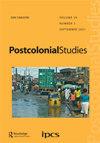Whose settler colonial state? Arctic Railway, state transformation and settler self-indigenization in Northern Finland
IF 1.8
3区 社会学
Q2 CULTURAL STUDIES
引用次数: 1
Abstract
ABSTRACT Settler colonial theory has effectively highlighted the continuity of colonial structures, but less attention has been paid on how also the settler state has transformed over time, and how such changes have affected the manifold relationships between the state, the settlers and the natives. This article addresses trajectories of settler colonial change in Finland, building on theories of state spatial transformation and taking the recurring plans to build a Railway across the Sámi homeland as its point of departure. The article suggests that central to the change is the destabilization of the relationship between the state and Northern Finland’s older, ‘endogenous’ settler communities. This has facilitated a popular turn to settler self-Indigenization, whereby settlers make new claims to being ‘Indigenous’, usually building on records of a distant (possibly) Indigenous ancestor. Since self-Indigenization directly challenges Indigenous self-determination, it articulates a new form of elimination of the native. The task for critical scholarship is not only to situate, contextualize and challenge such identity claims, but also to question the logic that continues to set especially older settler communities in opposition to Indigenous rights and self-determination, in the context of extractive and neoliberal development that ultimately may undermine both.谁的殖民国家?北极铁路、国家转型与芬兰北部移民自我本土化
定居者殖民理论有效地强调了殖民结构的连续性,但很少关注定居者国家如何随着时间的推移而转变,以及这种变化如何影响国家、定居者和当地人之间的多种关系。本文以国家空间转换理论为基础,以穿越Sámi家园的铁路建设计划为出发点,探讨芬兰定居者殖民变化的轨迹。文章认为,变化的核心是国家与芬兰北部较老的“内生”定居者社区之间关系的不稳定。这促进了定居者自我本土化的流行转变,即定居者通常根据遥远的(可能的)土著祖先的记录,提出新的“土著”主张。由于自我土著化直接挑战土著自决,它阐明了消灭土著的一种新形式。批判性学术的任务不仅是定位、背景化和挑战这种身份主张,而且还要质疑在采掘和新自由主义发展的背景下,继续将特别是老定居者社区置于反对土著权利和自决的逻辑,这最终可能会破坏两者。
本文章由计算机程序翻译,如有差异,请以英文原文为准。
求助全文
约1分钟内获得全文
求助全文

 求助内容:
求助内容: 应助结果提醒方式:
应助结果提醒方式:


